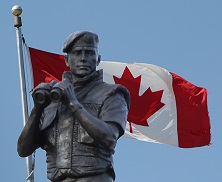True and Fascinating Canadian History

Vet of the Month: February, 2020
NWMP: Early Police Drowning Victims
RCMP Vets. Ottawa, ON
The vast majority of deaths to RCMP members are caused by motor vehicle accidents followed by their involvement in violent incidents which include firearms. Few Canadians associate police officers to drowning but since the formation of the North West Mounted Police (NWMP) in 1873, there has been 126 reported cases of RCMP members who have drowned in the course of job performance or while off duty. This is an unusual statistic, but it brings into focus the high number of preventable water-related fatalities which have occurred over time and within the police profession. The following short story is dedicated to the memory of a few early Canadian police officer pioneers. Each drowning is a sad tale.
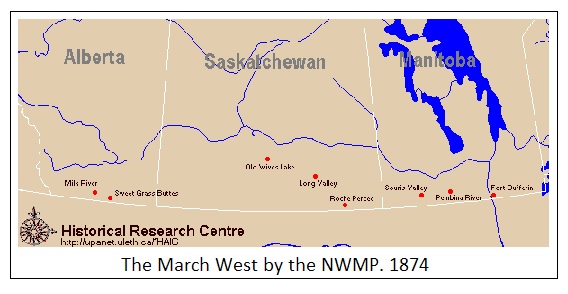
Reg.#o107, Sub Constable Joseph Leonidas Beaulieu was one of the earliest victims of a police officer drowning in Canada. He was born in Montreal, QC and as a young man, he joined the NWMP in June, 1873. He must have been in excellent physical condition because Joseph Beaulieu had ridden west as a member of the famous March West which covered the span of time from July 8th to October 9th 1874. The March West has been portrayed in the movies and by various authors as an epic journey of hardship and endurance by about 300 or so NWMP.
Sub Constable Beaulieu was a single man and after serving his term of three years, he left the NWMP and took up residence in Winnipeg. Meanwhile, his mother and his one brother remained in Montréal. Few people knew that Joseph Beaulieu was an excellent musician and he was soon reputed to be highly popular on the Winnipeg concert circuit. In 1878, The Winnipeg Free Press announced his unfortunate drowning. He was crossing the Red River on foot from Winnipeg to St Boniface when he fell through the thin ice and drowned. Witnesses tried to reach him by walking on the ice, but their efforts were unsuccessful. Joseph Beaulieu's body was never recovered. According to his obituary, Joseph Beaulieu's loss within the community was felt by many people in early Winnipeg.

Reg.#o318, Sub Constable John Dunbar was born in 1854 in Toronto. He was a member of the early NWMP and he too was on the March West in 1874. Like so many other young men at the time he responded to the call of adventure, challenge and excitement of Canada's north west and the distant unknown. It was while he was posted to Fort Macleod that John Dunbar developed an unusual stubborn streak that landed him in Service Court for two discipline infractions. In those days, senior NWMP Officers had a low tolerance for disobedience by any of the men.
In March, 1875 Sub Constable John Dunbar was charged for 'Refusing to Mount Guard'. He was fined $10. A few months later he was in Service Court again, this time for 'Refusing to go on Fatigue Detail'. For the second offence he was fined $2.
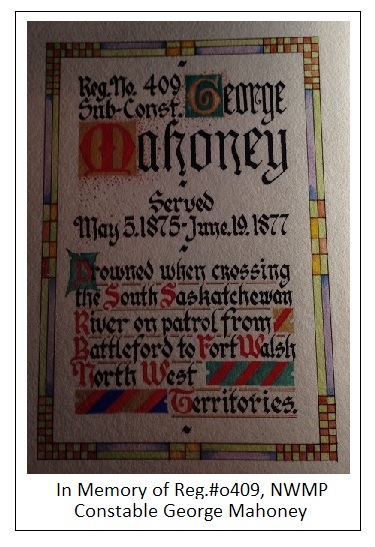
Jobs were far from secure in the early days of the NWMP, and it can't be said for sure, but one can speculate that after two trips to Service Court perhaps John Dunbar was invited to change careers by his Superior Officers. By this time, he had fulfilled his time commitment of three years service with the NWMP and then he left the Force at Fort Macleod. A year later, John Dunbar was swimming with friends when he drowned near Fort Macleod. His body was recovered by his chum Reg.#226, Constable David Grier. John Dunbar was buried in April, 1888 in Union Cemetery at Fort Macleod. John Dunbar was 34 years of age.
Constable George Mahoney was a young and dedicated police officer in early Canada. He joined the NWMP in May, 1875 and his first assignment was Battleford. Two years later on June 10, 1877 Constable Mahoney and his Metis Scout came upon the South Saskatchewan River while they were on a regular police patrol. Their intended destination was Fort Walsh. The duo decided to leave their horse team and the wagon on one side and to cross the river for a survey of river conditions using a flat boat which they had came upon.
While crossing the river in the boat, their small vessel suddenly tipped. The two were thrown into the water, and Constable Mahoney and his Scout found themselves deep in quick sand. The Scout was able to extricate himself from the sand underneath and to swim to shore, and Constable Mahoney also tried to wade ashore, but he got caught in the sand under water and he slowly began to sink.
In desperation and panic, he called out his verbal Last Will and Testament to the Scout and then he drowned. George Mahoney's body
was never recovered. It was only a few years later, that George Mahoney's wife Emma also died. According to retired RCMP Officer
and Historian Jack White the Land Warrant which had been granted to George Mahoney was redesignated to his maternal grandmother who
cashed it for $160 to support his 2 children.

In Canada's early pioneer days, recovery efforts were not as sophisticated as they are today, otherwise the body of Constable Beaulieu and the body of Constable Mahoney both might have been found and given Regimental burials.
Only mystery surrounds the following case, and very little is known about Reg.#1109, NWMP Constable Matthew Rice. He was hired as an early recruit on May 23rd, 1882 and he was instructed to head west. He was travelling alone. For reasons still unclear, Constable Rice disappeared from a boat on the Assiniboine River.
According to a subsequent police report, Constable Rice had complained earlier in the day of suffering from headaches and dizziness. He was last seen sitting on the ship's stern, but when the ship docked later in the day, Rice could not be found. He left without a trace. It was never satisfactorily uncovered if he jumped off the ship to escape service in the NWMP or whether he fell overboard and drowned? In police files to be safe, Constable Rice is listed both as a deserter and a police recruit who once drowned. One will never know the outcome of the last chapter of Constable Matthew Rice's life.
Special Constable Stick Sam of the NWMP drowned in the Kashawulsh River in the North West Territories in July, 1903. In the Commissioner's Report dated 1903, Inspector Archibald Edward Crosby McDonell laid out the circumstances of Special Constable Sam's drowning.
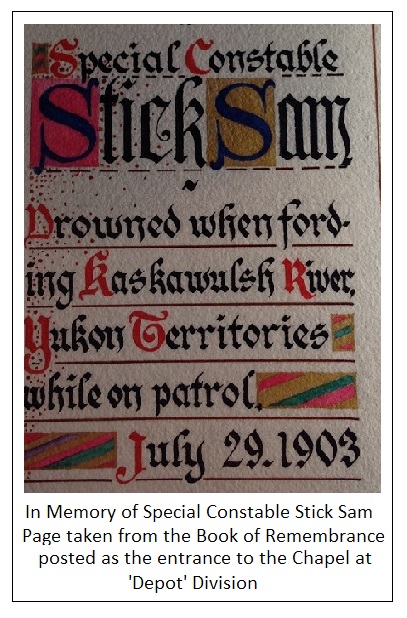
Summarizing Inspector McDonell's report, he wrote, "On July 23, 1903, while crossing the Kaskawulsh River Special Constable Sam lost his life. I crossed with my horse and shouted for Sam to follow. No sooner were the words out of my mouth than I found myself and horse in swimming water. I reached the opposite bank safely, and shouted for Sam to stop.
Sam found himself and horse in swimming water, he began pulling at the reins, until he pulled the horse over, drowning him, and before I could render any assistance Sam himself had disappeared. The body was found on August 10, 1903 by two prospectors and buried. The brother of the deceased exhumed the remains, and burnt them according to the Indian custom."
The suddenness of Special Constable Sam's death was a shock to Inspector McDonell. He concluded his report by writing, "An investigation was held, and an inquest was considered unnecessary. Special Constable Sam was a good all round man, only 26 years old, and has been on the Force for two years. He leaves a wife and children practically destitute, and I would like very much if something could be done in the way of supplying them with rations." The deep sadness of losing Stick Sam had an impact on everyone including his own family, his wife and their children. Inspector McDonell too recognized the invaluable contributions which Sam would have made both as a valued friend and as a Guide to the NWMP.
One should never forget the dangers and perils which continuously faced Canada's early settlers including the North West Mounted Police. Their daily lives must have been filled with every possible hazard including sickness and drownings. Today, police officers can be thankful that we have learned various ways and methods to more capably prevent harm to others and to eliminate hurt to ourselves.
The end.
Reporting from Fort Healy,
J. J. Healy
February 23, 2020
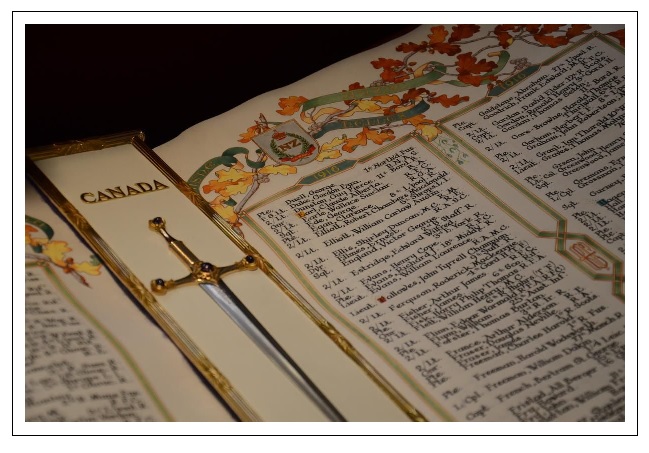
Note: The images which I used in the name of Constable George Mahoney and Special Constable Stick Sam were photographs of their special individualized Memorial Page taken from the Book of Remembrance and the RCMP Honour Roll. The Book cites every RCMP who has been killed on duty since 1873. The Book of Remembrance sits at the inside entrance to the Chapel at 'Depot' Division. (photos by J. J. Healy. 2012)
xR. I. P.

